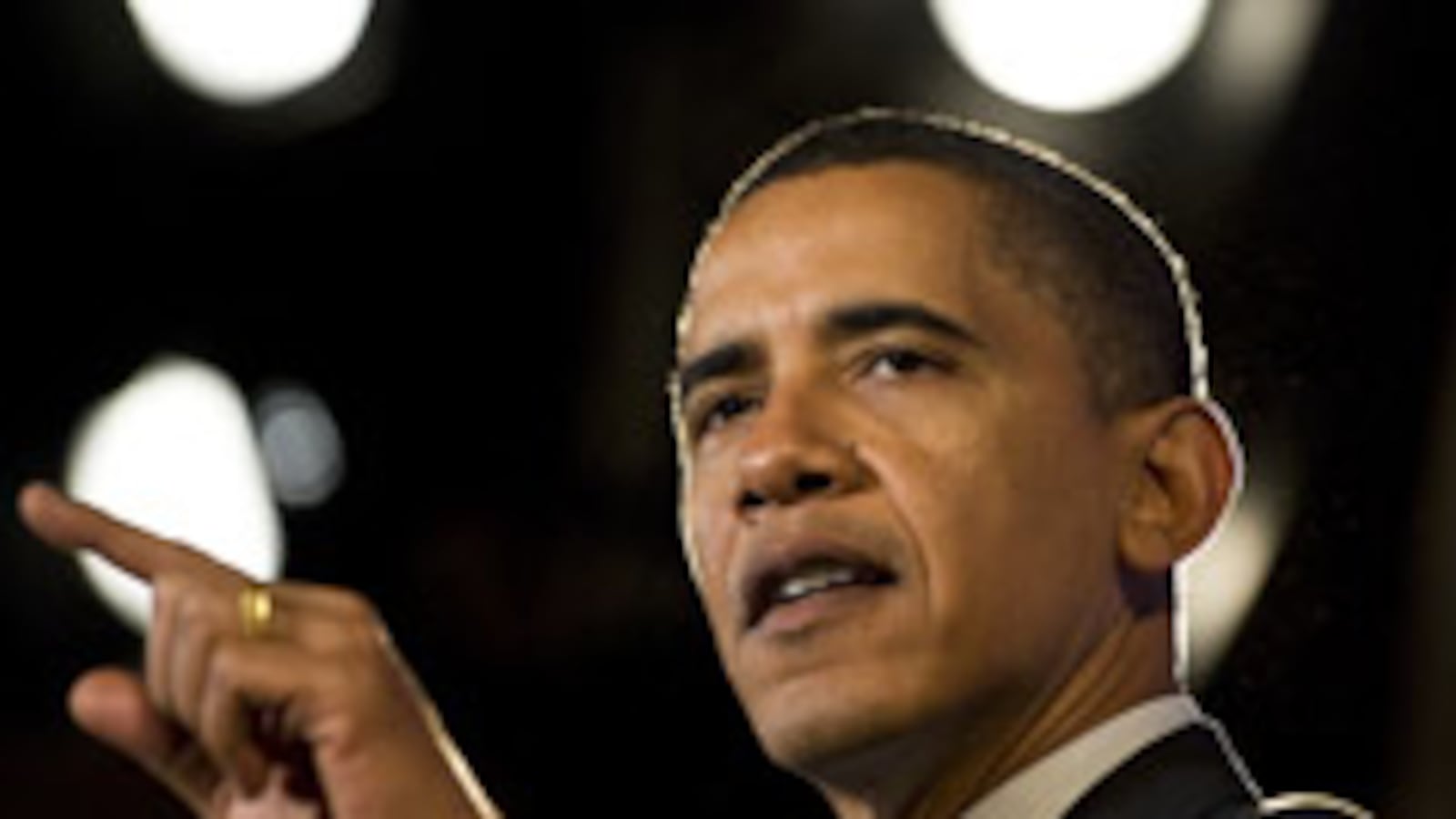
The Daily Beast's Michael Adler reports that the "steps to build confidence" announced Thursday are more concrete than Obama revealed. Iran has agreed to ship enriched uranium to Russia for processing, leaving it without enough to make a bomb.
President Obama’s statement about a confidence-building measure from Iran this afternoon left out the key detail: In a breakthrough agreement at talks in Geneva, Iran has agreed to send 1,200 kilograms of enriched uranium to Russia for further processing, two diplomats told The Daily Beast, noting this would mean Iran no longer has enough uranium to make a nuclear weapon.
The promised move by Iran would seem to clear the way to serious talks. “It’s a major advance if they keep their word,” a diplomat said.
The deal that Obama alluded to—leaving out the key details, first reported by The Daily Beast, that the third country involved was Russia, and the quantity of uranium involved constituted most of Iran’s stockpile—would leave Iran with only 300 kilograms of enriched uranium.
Washington fears Iran is using an allegedly civilian program to develop nuclear weapons. Enriched uranium can be used to make fuel for nuclear reactors, but also the explosive core of atom bombs.
The agreement was reached at talks in Geneva Thursday between Iran and six major powers—the United States, China, Britain, France, Russia, and Germany. The talks were the first since July 2008, part of a negotiating process pitting U.S.-led states against Iran that has sputtered and stalled since secret Iranian nuclear sites were revealed in August 2002. “The potential advantage of this, if it’s implemented, is that it would significantly reduce Iran’s [low-enriched uranium] stockpile, which itself is a source of anxiety in the Middle East and elsewhere,” a senior U.S. official in Geneva told reporters, adding that the International Atomic Energy Agency, a U.N. watchdog, would meet in Vienna on October 18 to try to iron out the details with Iran.
• The Daily Beast’s Reihan Salam: America Is Getting Hustled• The Daily Beast’s Reza Aslan: Naïve Obama Gets Iran Results• Gary Sick: Real Progress with Iran Iran’s standoff with the West has become urgent, because Iran has now amassed an estimated 1,500 kilograms of low-enriched uranium—enough to process further into an atomic bomb. The deal that Obama alluded to—leaving out the key details, first reported by The Daily Beast, that the third country involved was Russia, and the quantity of uranium involved constituted most of Iran’s stockpile—would leave Iran with only 300 kilograms of enriched uranium, even though it continues to make more. Iran can produce roughly 80 to 90 kilograms of enriched uranium a month at its enrichment facility in Natanz, the only one known to be running in the country.
According to the U.S. official, Iran said it was running out of fuel to power a research reactor in Tehran, which makes radio-isotopes for medicine. Under the deal reached today, diplomats told The Daily Beast, Russia will now take the majority of Iran’s stockpile, which is enriched only up to 3.5 percent, and refine it up to 19.75 percent. That new enrichment level is suitable to power the Tehran reactor, but not high enough for nuclear weapons. The official said France would take the enriched uranium from Russia and turn it into the actual fuel, further safeguarding that it would not be repurposed to make atom bombs. France would then ship this fuel to Iran.
The Tehran research reactor is under IAEA safeguards, and U.N. inspectors would be present there to ensure that fuel processed by Russia and France would only go toward making medicine.
Diplomats said this deal amounts to a face-saving way to freeze Iran’s suspect enrichment work. A freeze has been the condition for a second phase of talks at which nuclear issues will be discussed, as well as other proposals put forth by both sides.
Iran insists on its right to nuclear technology and has previously rejected either freezing or suspending its uranium enrichment. But it now has agreed to more talks, separate from the October 18 IAEA sitdown, likely around October 20, in either Geneva or Vienna. These so-called Phase 2 talks are to last six weeks and are to be followed by a Phase 3, at which all topics will be on the table, including giving Iranian trade and other benefits for reining in its nuclear ambitions, and during which Iran is to suspend all uranium enrichment.
Iran's making a deal is apparently due to the regime's wanting to legitimize itself after domestic unrest since June over a contested presidential election. The Iranian leaders may also feel vulnerable due to the discovery that they were hiding a second enrichment site. In the wake of this, Russia might align itself with the United States for strong U.N. sanctions against Iran.
Meanwhile, Iran has also agreed to IAEA inspections of a previously secret enrichment plant at Qom, which is being built and is not yet operational. IAEA head Mohammed ElBaradei is to head to Tehran soon to finalize the details of the inspections.
While there is concern that Iran could be hiding other nuclear sites, and even stockpiles of enriched uranium, diplomats said they are proceeding based on what is known, especially since Iran has taken such pains to protect its main site at Natanz, where some 4,500 spinning centrifuges continue to enrich uranium.
Michael Adler, a longtime reporter for Agence France-Presse, is a scholar at the Woodrow Wilson Center and is writing a book on Iran's nuclear diplomacy, which he has covered for most of this decade.






